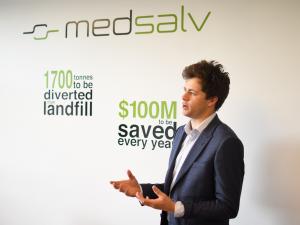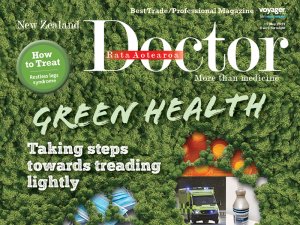For older people and frail people, the long-term benefit of medicines reduces and the potential for harm from adverse effects increases. When the benefit–risk balance changes in this way, medicine review and optimisation are important to simplify the therapeutic regimen, reduce inappropriate medicines and minimise risks. In this article, pharmacist prescriber Linda Bryant uses two case studies to illustrate important considerations during medicine reviews
Kiwi company aims to change minds about ‘single use’ medical products
Kiwi company aims to change minds about ‘single use’ medical products

We have more than half the hospitals in New Zealand using our products and programmes now
More than 100 different kinds of used medical products enter Medsalv’s premises for a thorough clean and remake, before being sent out for reuse.
Expansion from just a handful to such a large number of device types has come in two years for the Christchurchbased, homegrown Kiwi company.
It is “remanufacturing” items that would, until recently, have been regarded as single use, binned and landfilled at great cost to health organisations and the environment, including greenhouse gas emissions.
Medsalv remanufactures, sterilises and returns devices, and can track their reuse in the health sector.
“No other company in the southern hemisphere, as far as we know, provides the service,” says Oliver Hunt, Medsalv’s founder and owner, and developer of its technology.
The company has expanded its clientele and staff, and is hiring, Mr Hunt says.
“We have more than half the hospitals in New Zealand using our products and programmes now.”
Although customers are located from Whangārei to Invercargill, the emissions generated in sending products back and forth are insignificant compared with those from manufacturing new, often in China, Mr Hunt says.
He emphasises the company’s high attention to detail, guarantee that products will be sent out “as new”, and ongoing monitoring of each product. The processing plant is ISO certified.
The digitally monitored cleaning, retesting, labelling and packaging system puts each reprocessed device through a total of nine inspections.
On its website, the company says hospitals can expect to pay between 40 and 75 per cent of the new device price and to save 80-plus per cent by diverting devices compared with landfilling them.
By volume the most common item reprocessed is the inflatable prevention sleeve used in deep vein thrombosis.
Through Medsalv, Southern Cross Healthcare hospitals have various single use medical devices reprocessed, including DVT prevention sleeves.
Southern Cross Healthcare national sustainability lead Vanessa Neven says single-use, air-assisted transfer mattresses, for example, were previously landfilled after use, but are now collected, cleaned and reprocessed by Medsalv.
Mr Hunt says Medsalv works closely with health providers’ procurement teams and also with various device makers and suppliers.
Advice provided gratis can cover product analysis, suggestions for low environmental-impact design and materials, and potential for disposal or recycling into new products.
The company receives enquiries from general practice, but that part of the sector would generate small volumes of a wide variety of mainly low-cost items. It’s a niche Medsalv is not yet ready to service, Mr Hunt says.
We're publishing this article as a FREE READ so it is FREE to read and EASY to share more widely. Please support us and the hard work of our journalists by clicking here and subscribing to our publication and website





